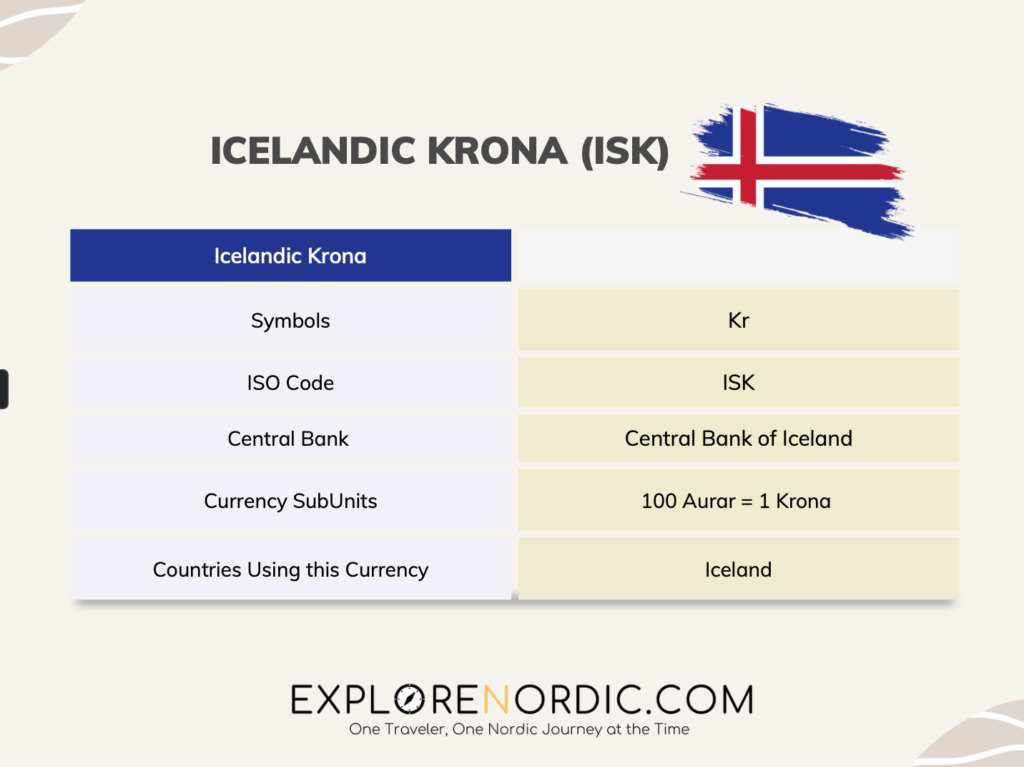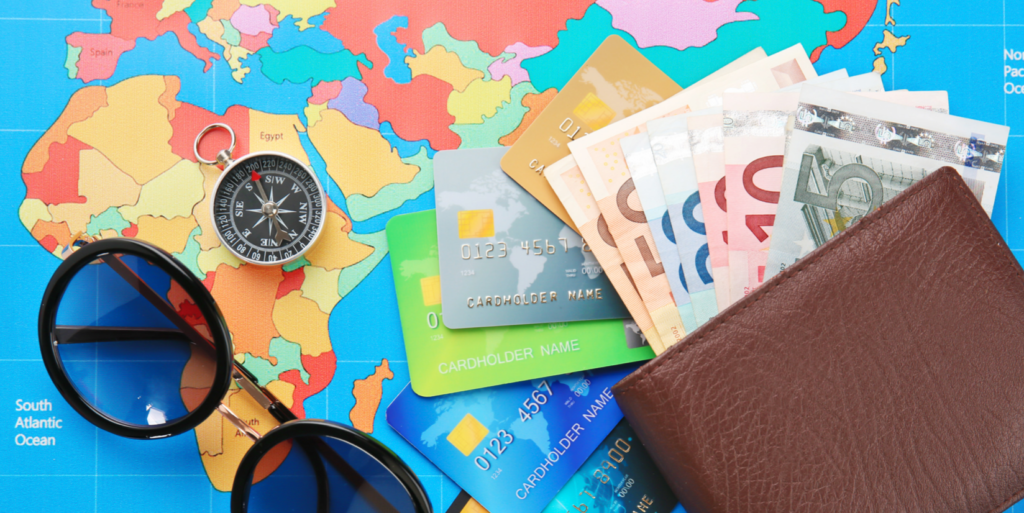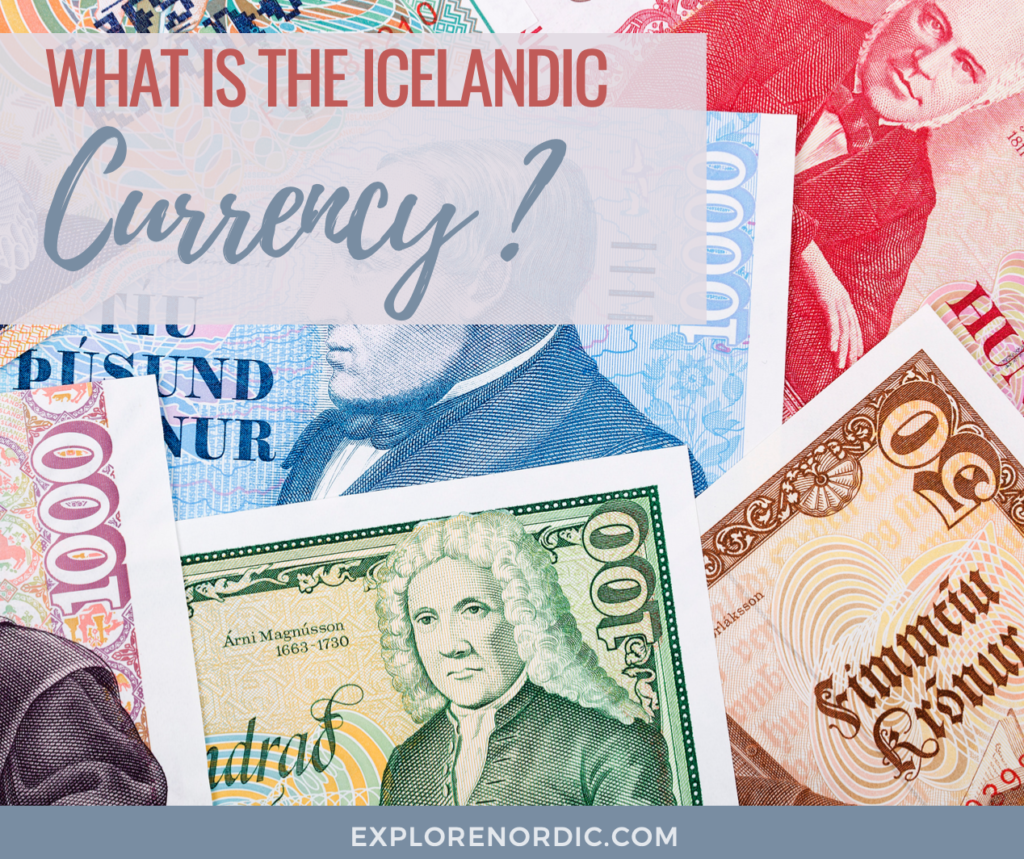Iceland is a country located in the North Atlantic Ocean. It is known for its unique natural beauty, including glaciers, hot springs, and waterfalls. What money do they use in the country? What is the currency in Iceland? The currency used in Iceland is the Icelandic Krona, which is abbreviated as “ISK”. Icelandic Krona is the official currency of the country.

Value of the Icelandic Krona
The value of the Icelandic Krona fluctuates daily based on market conditions and the country’s economic performance. As of February 2023, one US dollar is worth approximately 140 Icelandic Kronur.
Coins and Banknotes – The Icelandic Krona is divided into 100 aurar /eyrir (cents) and is available in coins of denominations of 1, 5, 10, 50, and 100 aurar. Banknotes come in denominations of 500, 1000, 2000, and 5000 Kronur. The banknotes feature portraits of notable Icelandic figures, such as politicians, writers, and poets. The coins depict various themes such as fish, birds, and historical landmarks.
Credit Cards in Iceland
Credit cards are widely accepted in Iceland and are a convenient and secure way to make purchases and withdraw cash. Major credit cards, such as Visa, Mastercard, and American Express, are accepted at most hotels, restaurants, shops, and other establishments.
Using a credit card in Iceland can be especially useful for travelers, as it allows them to access their funds from their home country without the need to exchange currency or carry large amounts of cash. Credit cards also offer protection against theft, fraud, and other financial risks.
When using a credit card in Iceland, it is important to be aware of any fees or charges that may apply. For example, some credit cards charge a foreign transaction fee for purchases made in a foreign currency. It is also a good idea to inform your credit card provider of your travel plans. This can help prevent any security alerts or freezes on your account.
ATMs
ATMs are widely available in Iceland and are a convenient way to access cash. ATMs are typically found in cities and towns and are easily accessible at banks, shopping centers, and other locations.
Using an ATM in Iceland is straightforward and similar to using an ATM in other countries. You can withdraw cash using a debit or credit card, and the process is usually quick and secure. Most ATMs in Iceland support multiple languages, including English.
It is important to note that some ATMs in Iceland may charge fees for withdrawals. Especially, if you are using a foreign bank card. It is a good idea to check with your bank or credit card provider to find out if there are any fees or charges that may apply when using an ATM in Iceland.
Icelandic Mobile Payment Apps
Mobile payments are becoming increasingly popular in Iceland, as more and more consumers seek convenient and secure ways to make payments. Mobile payments allow users to make purchases, transfer funds, and manage their finances using their smartphones or other mobile devices.
There are several mobile payment options available in Iceland. These include mobile banking apps from local banks like Landsbankinn and Íslandsbanki. Mobile wallets such as Apple Pay and Google Pay, and payment apps from third-party providers like Paypal are also common. These apps allow users to easily and securely make payments, view account balances and manage their finances from their mobile devices.
Using mobile payments in Iceland is convenient and secure, as the transactions are encrypted and protected by various security measures. Mobile payments also eliminate the need for cash, checks, or credit cards, making them a safe and easy option for making payments on the go.
Is Iceland Considered a Cashless Society?
Iceland is not a completely cashless society, but it is considered to be one of the most technologically advanced and cashless countries in the world. In Iceland, cash is still widely accepted, but digital payment methods are becoming increasingly popular, with many consumers relying on debit and credit cards, mobile payments, and other electronic payment systems for their everyday transactions.
The widespread use of digital payment methods in Iceland is due to a variety of factors. These include high levels of financial literacy, the widespread availability of technology and internet access, and a strong banking sector. Additionally, Iceland has a strong tradition of using technology to make everyday life more convenient. This also extends to the way that Icelanders make payments.
Are there any restrictions on the amount of currency I can bring into Iceland?
There are no restrictions on the amount of foreign currency that can be brought into Iceland. However, it is important to declare any amount of cash that exceeds the equivalent of 10,000 EUR upon arrival in Iceland. This is to comply with Iceland’s anti-money laundering and terrorist financing regulations. Failure to declare large amounts of cash may result in the seizure of the funds and potential legal consequences.
Additionally, travelers entering Iceland may also be subject to customs controls and searches, and failure to declare any undeclared cash may result in fines or other penalties.
Tipping in Iceland

Tipping is not a common practice in Iceland, and is not expected or required in most service-based industries. In Iceland, service workers, such as waiters, bartenders, and taxi drivers, typically earn a decent wage. Therefore tipping is not necessary to supplement their income.
However, if you receive exceptional service, it is always appreciated and a small tip may be given as a token of appreciation. Say that you had a full-day excursion and had an amazing tour guide. A small tip to show you enjoyed your day, will most likely be appreciated by the guide. But again, tipping is not mandatory, and the amount of the tip is completely up to the individual.
A common practice for tipping in Iceland is rounding up the bill to the nearest whole number. Alternatively leaving a small amount for exceptional service. If you are at a restaurant or a bar, rounding up is a common thing to do. The same thing goes for transportation. If you use a cab, rounding up shows your appreciation. Tipping at hotels might be done if you get exceptional room service otherwise it’s not common.
Taxes to Be Aware of Visiting Iceland
As a visitor to Iceland, be aware of the taxes that you may be subject to during your stay. Some of the taxes that you should know about include:
- Value-Added Tax (VAT): VAT is a tax applied to most goods and services in Iceland, and is included in the prices of most items. The standard VAT rate in Iceland is 24%, but there are lower rates for certain items, such as food, books, and medicines.
- Excise Taxes: Excise taxes are applied to certain goods, such as alcohol and tobacco products, and are included in the price of the item. The amount of excise tax can vary depending on the product.
- Tourist Tax: There is no specific tourist tax in Iceland, but some tourist services, such as hotel stays, may be subject to an additional service charge.
- Car Rental Tax: Car rental services in Iceland may be subject to an additional tax, which can vary depending on the rental company and the type of vehicle being rented.
What is the Currency in Iceland? The History of the Icelandic Krona
The Icelandic Krona has a rich history that spans over a century and a half. It was first introduced as the official currency of Iceland in 1874, replacing the Danish Krone. At that time, Iceland was a Danish territory and its currency was closely tied to the Danish economy.
From 1925 to 1939, the Icelandic krona was pegged to the British pound. Later in 1939, the Krona was pegged to the US dollar, but this too was changed in 1949.
In the late 20th and early 21st century, Iceland experienced significant economic growth and prosperity. But, this was followed by a severe financial crisis in 2008. The crisis was caused by the collapse of the country’s banking system, which led to a rapid depreciation of the Icelandic Krona. The government responded by implementing strict economic reforms, which helped stabilize the currency and the economy.
Since then, the Icelandic Krona has regained its value and stability, and the country’s economy has continued to recover. The currency is now a key component of Iceland’s financial system and plays a crucial role in the country’s economic stability and prosperity.
Overall, the history of the Icelandic Krona reflects the ups and downs of the country’s economy and its evolution from a Danish territory to an independent and prosperous nation. The currency is a symbol of the country’s identity and its place in the world as a unique and dynamic nation.
The Future, the Icelandic Krona?
It is difficult to predict the future of the Icelandic Krona, as it is subject to a variety of economic and political factors, both domestically and globally. However, the Central Bank of Iceland and the Icelandic government have taken steps to maintain the stability and reliability of the currency, and the Krona has generally been stable in recent years.
In the future, the value of the Krona may be affected by a variety of factors. These include inflation, interest rates, and economic growth. Additionally, geopolitical events, such as trade agreements, economic sanctions, and global financial crises, may also have an impact on the Icelandic Krona.
The Central Bank of Iceland and the Icelandic government have taken steps to maintain the stability of the currency. Such as implementing monetary policy measures, including setting interest rates and managing the money supply and taking steps to control inflation.
The Icelandic Krona is an important part of the country’s history and economy. Its value fluctuates based on market conditions and the country’s economic performance, and it is available in both coins and banknotes. Visitors to Iceland can easily exchange their foreign currency or use credit cards to make purchases during their stay. Overall, the Icelandic Krona is a valuable and practical currency for those visiting or doing business in Iceland.





